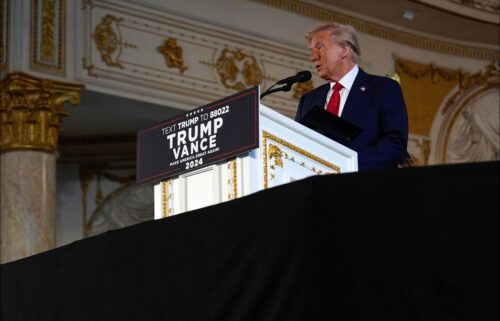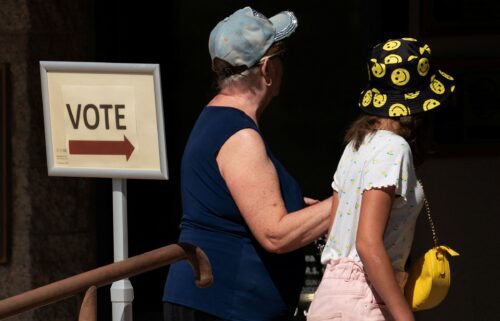Milley defends Trump-era calls to Chinese counterpart in congressional Afghanistan hearing
By Zachary Cohen, Oren Liebermann and Ellie Kaufman, CNN
Top US General Mark Milley offered a full-throated defense of his behavior during the last days of the Trump administration, including a phone conversation with his Chinese counterpart, as he and other senior military officials appeared before lawmakers on Tuesday for a hearing about the withdrawal from Afghanistan.
Specifically, Milley said the call with the Chinese official, which was intended to assure him the US was not about to launch a military attack, was not only appropriate but that numerous senior Trump officials were aware it occurred.
“I personally informed both Secretary of State [Mike] Pompeo and White House Chief of Staff [Mark] Meadows about the call, among other topics. Soon after that, I attended a meeting with Acting [Defense] Secretary [Chris] Miller, where I briefed him on the call,” he told members of the Senate Armed Services Committee.
Milley and Secretary of Defense Lloyd Austin are testifying publicly before Senate lawmakers Tuesday, the first time that top military officials are appearing before Congress since the full withdrawal of US troops from Afghanistan.
Austin and Milley are joined by the leader of US Central Command, Gen. Frank McKenzie, who played an integral role in facilitating the evacuation from Kabul — an effort that has been the focus of immense bipartisan criticism since the last American military aircraft departed the Afghan capital.
Peril
In his opening remarks, Milley specifically addressed new reporting in “Peril,” a book by Washington Post reporters Bob Woodward and Robert Costa, which details the military leader’s phone conversations to reassure a nervous Chinese general and his efforts to limit then-President Donald Trump from potentially ordering a dangerous military strike.
Milley’s actions, which were reported by CNN and others earlier this month ahead of the book’s release, spawned sharp criticism from Trump and his allies, including calls for Milley’s resignation and that he be tried for treason.
Two unclassified memos submitted by Milley to the Senate Armed Services Committee, and obtained by CNN, include a timeline of calls between Trump administration Department of Defense officials and Chinese officials that took place from November 2019 to January 2021.
The timeline shows Milley spoke with General Li Zuocheng in December 2019 and April 2020 as well as the October 2020 and January 2021 calls that had previously been reported.
The other memo submitted to Congress provides background information about Milley’s call with House Speaker Nancy Pelosi on January 8, two days after the insurrection on Capitol Hill. The memo says that Milley “immediately informed” then-Acting Secretary of Defense Chris Miller about his call with Pelosi and seems to attribute any disparaging comments about the former President during the conversation to the House Speaker.
“At no time was I attempting to change or influence the process, usurp authority, or insert myself into the chain of command, but I am expected to give my advice and ensure the President is fully informed,” Milley said in the memo.
The memo with the timeline of calls between Chinese officials and DoD officials also provides relevant statutory guidance about the Chairman’s role in advising the President of the United States.
According to the memo, communication between the President or the Secretary (or their duly deputized alternates or successors) and the combatant commands “will be transmitted through the Chairman unless otherwise directed,” the memo states.
The primary focus of Tuesday’s hearing, however, was Afghanistan. Lawmakers pressed all three military officials on a variety of issues including the administration’s plan for conducting counterterrorism operations in the country going forward and recommendations that were made to the President prior to the withdrawal itself.
During the hearing, McKenzie said that he recommended the US keep 2,500 troops in Afghanistan, a recommendation Milley said he agreed with. The testimony appears to contradict President Joe Biden’s claim to the contrary during an interview last month.
“I also had a view that the withdrawal of those forces would lead inevitably to the collapse of the Afghan military forces, and eventually the Afghan government,” McKenzie said.
Biden, when asked in an interview with ABC on August 18 interview if top military wanted him to keep about 2,500 troops in the country, said, “No, they didn’t. It was split … That wasn’t true.”
Later, Milley and McKenzie said that their assessments that the US should maintain 2,500 troops in Afghanistan were their personal opinions and told lawmakers they would not discuss their specific recommendations to the President.
Austin told lawmakers that he knows Biden “to be an honest and forthright man.”
Speaking of his fellow military leaders, Austin said, “Their input was received by the President and considered by the President, for sure. In terms of what they specifically recommended, Senator, they just, as they just said, they’re not going to provide what they recommended in confidence.”
A blow to morale
Still, Milley also made clear he and other military leaders warned both the Trump and Biden administrations that a quick withdrawal could lead to a collapse of the Afghan government and military, then ultimately lead to a complete Taliban takeover.
“I also had a view that the withdrawal of those forces would lead inevitably to the collapse of the Afghan military forces, and eventually the Afghan government,” McKenzie added.
At the same time, all three witnesses insisted that there was no intelligence indicating the Taliban would take over Kabul in a matter of days and said the Afghan army’s quick collapse under the advance of the Taliban came as a surprise.
They said, however, that the Doha Agreement that the Trump administration reached with the Taliban was a blow to the morale and performance of the Afghan security forces.
McKenzie told lawmakers Tuesday, “It’s my judgment that the Doha Agreement did negatively affect the performance of the Afghan forces, in particular by some of the actions the government of Afghanistan was required to take as part of that agreement.”
Milley agreed, testifying that it was his assessment that the Doha deal “did affect the morale of the Afghan security forces.”
He also noted that of the seven conditions placed on the Taliban in the Doha Agreement, signed in early 2020, only one was followed. The Taliban never attacked US forces following the agreement, but “failed to fully honor any other commitments,” Milley said.
A much more complicated relationship
McKenzie and Milley said they predict the relationship between Pakistan and the Taliban will become more complicated now that the latter is in control of Afghanistan.
“I believe Pakistan’s relationship with the Taliban is going to become significantly more complicated as a result of the US withdrawal from Afghanistan,” said McKenzie, who added that there are ongoing deliberations with Pakistan over the use of a vital air corridor to access Afghanistan.
“Over the last 20 years, we’ve been able to use what we call the air boulevard to go in over western Pakistan and that’s become something that’s vital to us, as well as certain land lines of communication, and we’ll be working with the Pakistanis in the days and weeks ahead to look at what that relationship is going to look like in the future,” he said.
Both Milley and McKenzie declined to discuss whether they have concerns about Pakistan’s nuclear weapons and the potential that they could fall into the hands of terrorists, noting there were a series of things they could talk about in Tuesday afternoon’s closed session.
McKenzie said it was “yet to be seen” whether terrorist groups like al Qaeda and ISIS will use Afghanistan as a launchpad.
“We’re still seeing how Al Qaeda and ISIS are configuring themselves against the Taliban, we’re still seeing what the Taliban is going to do,” he said. “I would not say I’m confident that that’s going to be on the ground yet, we could get to that point but I do not yet have that level of confidence.”
Meanwhile, Milley characterized the non-combatant evacuation mission — focused on US and foreign citizens, as well as some Afghans in Kabul — a “logistical success, but a strategic failure,” prompting some criticism from lawmakers who took issue with his comments given the fact that hundreds of Americans and Afghan allies were ultimately left behind.
‘We wanted to be ready and we were’
In his opening remarks, Austin emphasized the planning that preceded the evacuation from Afghanistan and the positioning of forces that allowed troops to arrive in Kabul fairly quickly as the evacuation began. As early as spring, the Pentagon began thinking about the possibility of a non-combatant evacuation and preparing for a number of scenarios, Austin said. By early June, Austin pre-positioned forces in the region, he said, including three infantry battalions.
“We wanted to be ready, and we were,” he said.
Although the first two days of the evacuation were “difficult,” Austin acknowledged, US troops restored order in 48 hours, and the herculean effort to move tens of thousands of American citizens and at-risk Afghans began in earnest.
“We are still working to get Americans out who wish to leave,” Austin said, though that is now the job of the State Department and the interagency, not the military. Lawmakers have repeatedly criticized the Biden administration for concluding the military evacuation and withdrawal from Afghanistan while there were still American citizens who wanted to leave the country. They have also criticized the administration’s inability to say just how many Americans are left in Afghanistan.
On Monday, a senior State Department official said the department is working to get out approximately 100 US citizens and Afghan Green Card holders from Afghanistan, but there was no indication of when that might happen or by what route they would leave the country.
“Even with no military presence on the ground, that part of our mission is not over,” Austin said.
Austin also defended the military’s decision to transfer Bagram Air Base to the Afghan National Defense and Security Forces, a move which quickly saw the sprawling base and hub of US operations fall to the Taliban. He said it would have required 5,000 troops to defend Bagram, and it would have “contributed little” to defending the embassy in Kabul about 30 miles away, which was initially the primary mission.
“Staying at Bagram, even for counter-terrorism purposes, meant staying at war in Afghanistan, something that the President made clear he would not do,” Austin said.
As he neared the end of his opening remarks, Austin shifted his focus to the entire 20-year war, asking if the US had the right strategy, if it believed falsely that it could build an Afghan government that would last, and if it could create a self-sustaining Afghan military. Austin admitted frankly that the US never understood the problems on the ground in Afghanistan, including endemic corruption that undermined and delegitimized the US-backed government. The collapse of the Afghan army in the face of a Taliban offensive “took us all by surprise,” Austin said.
“We helped build a state, but we could not forge a nation,” Austin said.
This story has been updated with additional developments.
The-CNN-Wire
™ & © 2021 Cable News Network, Inc., a WarnerMedia Company. All rights reserved.
CNN’s Michael Conte, Jennifer Hansler, Christian Sierra and Hannah Sarisohn contributed to this report.


